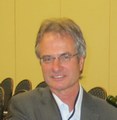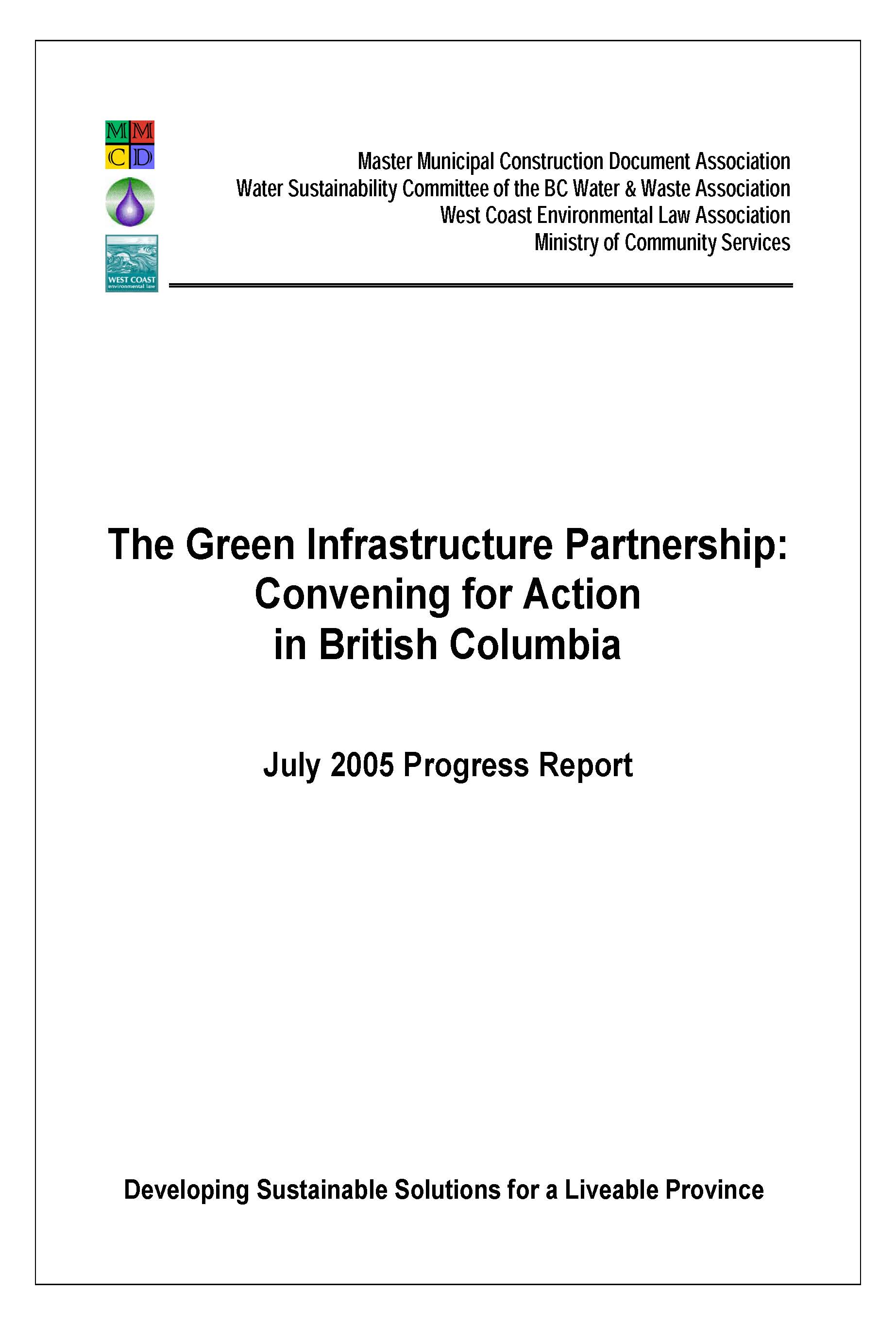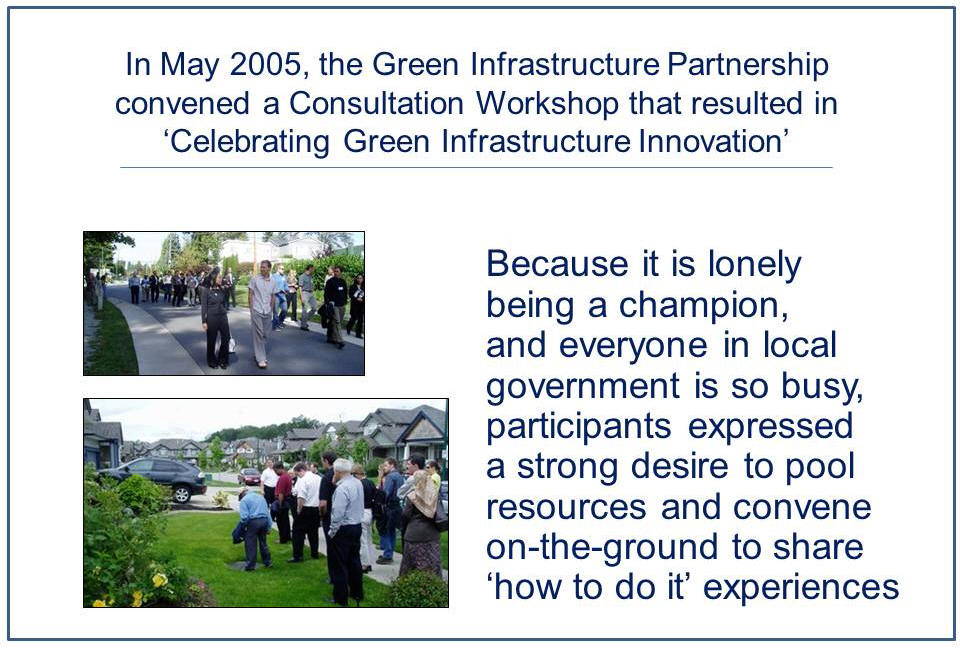“We witnessed the motivational power of celebrating successes,” says Raymond Fung, Past-Chair, BC Green Infrastructure Partnership
Note to Reader:
In May 2005, the City of Surrey hosted a consultation workshop on green infrastructure. This was the first regional event held in Metro Vancouver under the umbrella of Convening for Action in British Columbia, a program element of the Water Sustainability Action Plan. Organized by the BC Green Infrastructure Partnership (GIP), and framed from a local government manager perspective, the workshop was designed to engage the Metro Vancouver Regional Engineers Advisory Committee (REAC). In 2010, the GIP’s responsibilities were merged with those of the Partnership for Water Sustainability.
Greening of BC Communities: 10-year milestone for “Convening for Action in Metro Vancouver”
Historical Context
A decade ago, the BC Green Infrastructure Partnership (GIP) was an early champion of a ‘design with nature” approach to land development and greening of communities. The GIP drew attention to this need: “What is lacking is communication documents about ‘green infrastructure’ that are written from the perspective of senior managers, by senior managers, for senior managers and elected officials.”
Consultation Purpose:
The 2005 Metro Vancouver REAC Consultation Workshop sought input into the GIP work plan for developing policy and technical communication guides for elected officials and senior managers, respectively.
Workshop Outcome
“The workshop proved to be a revelation for all those who participated,” recalls Raymond Fung. He is Director, Engineering & Transportation for the District of West Vancouver. He served as GIP Chair from 2008 through 2012, and is a founding member of the Leadership Team for the Partnership for Water Sustainability in BC.
 “As we went around the table, the stories came out as to what Metro Vancouver municipalities were doing. A common refrain was: ‘We didn’t know you were doing that!’ The energy in the room just kept building and building. At the end of the day, we literally tore up our work plan. It was clear that practitioners did not need another guidance document that would go on a shelf. Rather, they needed to network and learn from each other.”
“As we went around the table, the stories came out as to what Metro Vancouver municipalities were doing. A common refrain was: ‘We didn’t know you were doing that!’ The energy in the room just kept building and building. At the end of the day, we literally tore up our work plan. It was clear that practitioners did not need another guidance document that would go on a shelf. Rather, they needed to network and learn from each other.”
“The 2005 workshop truly was a dynamic and transformational event. We witnessed the motivational power of celebrating successes. We also recognized the need to get the story out about the leadership being shown by local government. This influenced everything that followed, including the work on Vancouver Island by the CAVI regional team.”
Peer-to-Peer Learning
The 2005 REAC Workshop resulted in the pilot 2006 Showcasing Green Infrastructure Innovation Series in Metro Vancouver. In 2007, this was followed by parallel series in Metro Vancouver and on the east coast of Vancouver Island. In 2008, the Capital Region (at the south end of Vancouver Island) hosted a series which raised the bar by showcasing integration and innovation at a community-scale.
Talent Development:
 “Practitioners in local government want to learn from those who are innovating, and they want to visit projects that are precedent-setting. During the period 2006-2008, the Showcasing Innovation Series enabled local governments to tell their stories in a way that no other forum provided,” recalls John Finnie, Past-Chair (2006-2011), CAVI-Convening for Action on Vancouver Island. He is also a member of the Leadership Team for the Partnership for Water Sustainability in BC.
“Practitioners in local government want to learn from those who are innovating, and they want to visit projects that are precedent-setting. During the period 2006-2008, the Showcasing Innovation Series enabled local governments to tell their stories in a way that no other forum provided,” recalls John Finnie, Past-Chair (2006-2011), CAVI-Convening for Action on Vancouver Island. He is also a member of the Leadership Team for the Partnership for Water Sustainability in BC.
Inter-Regional Collaboration:
The success of the Showcasing Innovation Series created the early momentum that subsequently led to the Georgia Basin Inter-Regional Education Initiative (IREI). Launched in 2012, the IREI provides local governments on the east coast of Vancouver Island and in Metro Vancouver with a mechanism to share outcomes and cross- pollinate experience.
pollinate experience.
“Sharing of knowledge and experience through ‘organic collaboration’ is vital because peer-to-peer learning is what practitioners respect most,” observes Thomas White, Manager Climate Risk Management, Climate Action Secretariat (Ministry of Environment).

To download the Consultation Report, click on http://www.waterbucket.ca/cfa/sites/wbccfa/documents/media/79.pdf



